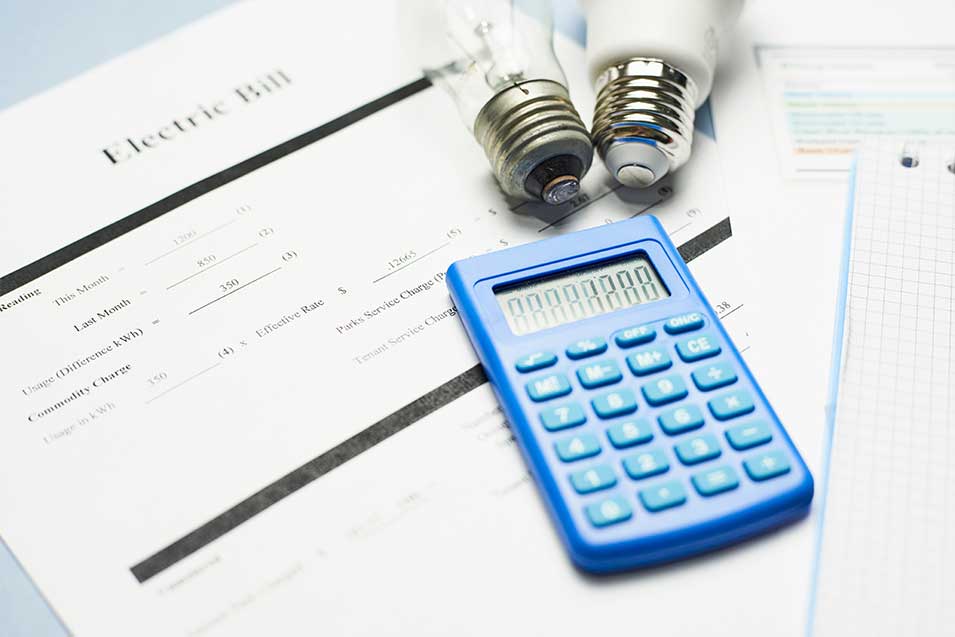
How do you calculate electricity bills?
Electricity bills are an essential part of our monthly expenses. However, many people don’t fully understand how they are calculated, which can lead to confusion and frustration when the bill arrives. In India, electricity tariffs are regulated by the State Electricity Regulatory Commissions, and the billing process is fairly straightforward. In this blog, we’ll take a closer look at how electricity bills are calculated in India.
- Meter Reading:- The first step in calculating your electricity bill is meter reading. A meter reader from your electricity distribution company (DISCOM) will come to your house and take a reading of your electricity consumption. The meter measures the amount of electricity you have used since the last meter reading. The meter reading is typically recorded in units of kilowatt-hour (kWh).
- Tariff Rates:- The next step is to determine the tariff rates. Tariff rates are set by the State Electricity Regulatory Commission and are based on various factors such as the cost of generating and distributing electricity, fuel prices, and other operational expenses. The tariff rates may vary based on the category of consumers, such as residential, commercial, or industrial. The tariff rates are published on the DISCOM’s website and can also be obtained by contacting their customer care.
- Energy Consumption Calculation:- The energy consumption is calculated by subtracting the previous meter reading from the current meter reading. The difference is then multiplied by the tariff rate per unit of electricity consumption. For example, if your previous meter reading was 1000 kWh, and the current reading is 1200 kWh, then your energy consumption would be 200 kWh (1200 – 1000). If the tariff rate is Rs. 5 per kWh, then your energy consumption cost would be Rs. 1000 (200 x 5).
- Fixed Charges:- Apart from the energy consumption charges, some DISCOMs may also charge a fixed fee, also known as a service connection charge, which is charged every month regardless of the amount of electricity consumed. The fixed charges may vary based on the type of connection, such as single-phase or three-phase, and the category of consumers.
- Taxes and Other Charges:- Finally, taxes and other charges such as meter rent, electricity duty, and others are added to the bill. In India, the GST (Goods and Services Tax) on electricity is levied at a rate of 5%.
In conclusion, calculating electricity bills in India involves meter reading, determining tariff rates, calculating energy consumption, adding fixed charges, taxes, and other charges. It is important to note that energy consumption is the primary factor in determining the electricity bill, and reducing energy consumption through energy-efficient practices can significantly reduce the bill amount. Understanding the billing process and taking steps to conserve energy can help consumers save money and contribute to a sustainable future.
Frequently Asked Questions (FAQs) About Electricity Bill Calculation:
1.What is the formula to calculate electricity bills in India?
To calculate your electricity bill, follow these steps:
Watts = (amps) x (volts)
Kilowatt-hours = (watts) x (usage) / 1000.
Cost = (kilowatt-hours) x (electricity rate)
- Subtract the current meter reading from the previous month’s reading to find the energy consumption.
- Multiply the units consumed by the per-unit charges based on the applicable slabs (e.g., Rs. 4.22 for 1-100 units, Rs. 5.02 for 101-200 units).
- Add the fixed charge and energy duty (e.g., Rs. 40 fixed charge and Rs. 0.15 per unit) to the energy charges.
- The sum of the energy charges, fixed charge, and energy duty gives you the total bill amount.
- Example: If you consumed 250 units with the applicable slabs mentioned above, the energy charges would be Rs. 1218. Adding the fixed charge and energy duty, the total bill amount would be Rs. 1296.
2.What are the top energy-saving tips to reduce your monthly bill?
Here are some top energy-saving tips to reduce your monthly bill in India:
- Use energy-efficient appliances and LED lighting.
- Turn off lights, fans, and electronics when not in use.
- Opt for natural lighting during the day.
- Set air conditioners to moderate temperatures.
- Insulate doors and windows to prevent heat loss.
- Unplug chargers and unused electronics.
- Use power-saving modes on devices.
- Regularly maintain and clean appliances for optimal efficiency.
- Use sunlight for drying clothes instead of using a dryer.
- Educate and encourage family members to practice energy-saving habits.
3.What is a unit of electricity used in India?
The unit of electricity commonly used in India is kilowatt-hour (kWh). It represents the amount of energy consumed when a power load of one kilowatt operates for one hour. The electricity bills in India are usually calculated based on the number of kilowatt-hours consumed by a consumer.
4.Are there any other charges on the electricity bill besides the energy charges?
In addition to the energy charges based on kilowatt-hours consumed, electricity bills in India may include other charges and taxes. These can include energy duty, surcharges, fixed charges, and other applicable taxes imposed by the electricity board or regulatory authorities. The specific charges and taxes can vary depending on the respective electricity board and its policies.

